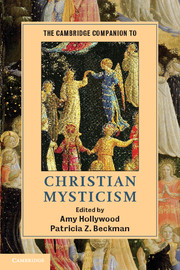Book contents
- Frontmatter
- Contents
- Contributors
- Introduction
- Part I Contexts
- Part II Key Terms
- Part III Contemporary Questions
- Select Bibliography of Christian Mystical Texts up to around 1750
- Select Bibliography of Modern Works Related to the Study of Western Christian Mysticism
- Author and Artist Index
- General Index
- References
Introduction
Published online by Cambridge University Press: 05 December 2012
- Frontmatter
- Contents
- Contributors
- Introduction
- Part I Contexts
- Part II Key Terms
- Part III Contemporary Questions
- Select Bibliography of Christian Mystical Texts up to around 1750
- Select Bibliography of Modern Works Related to the Study of Western Christian Mysticism
- Author and Artist Index
- General Index
- References
Summary
In the ninth book of the Confessions, the Christian bishop Augustine of Hippo (354–430) writes of an experience he shared with his mother, Monica. The two were in Italy, preparing to travel back to their native North Africa. One day, deep in conversation, they wondered “what the eternal life of the saints would be like,” concluding “that no bodily pleasure, however great it might be and whatever earthly light might shed luster upon it, was worthy of comparison, or even of mention, beside the happiness of the life of the saints.” As they spoke, Augustine tells us, “the flame of love burned stronger” in them and raised them “higher toward the eternal God.” Their thoughts ranged over all material things up to the heavens, and then beyond the material heavens to their own souls.
Yet for Augustine and Monica, the “eternal life of the saints” lay beyond even the realm of immaterial souls, in a place of “everlasting peace” governed by Wisdom. And so, Augustine explains, as he and his mother
spoke of the eternal Wisdom, longing for it and straining for it with all the strength of our hearts, for one fleeting instant we reached out and touched it. Then with a sigh, leaving our spiritual harvest bound to it, we returned to the sound of our own speech, in which each word has a beginning and an ending – far, far different from your Word, our Lord, who abides in himself forever, yet never grows old and gives new life to all things.
- Type
- Chapter
- Information
- The Cambridge Companion to Christian Mysticism , pp. 1 - 34Publisher: Cambridge University PressPrint publication year: 2012
References
- 9
- Cited by



